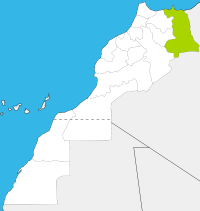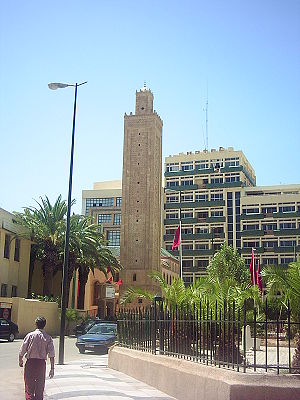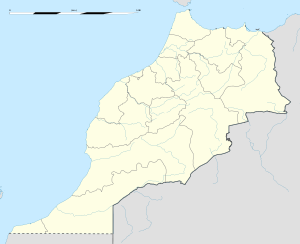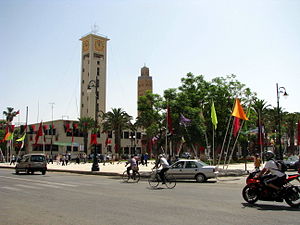- Oujda
-
Oujda
وجدة
ⵡ:ⵊⴷⴰ (Wujda)location of Oujda in Morocco Coordinates: 34°41′21″N 1°54′41″W / 34.68917°N 1.91139°W Country  Morocco
MoroccoRegion Oriental First settled Roman times Modern city 994 Population – Urban 1 100,000 Time zone WET (UTC+0) – Summer (DST) WEST (UTC+1) Oujda (Arabic: وجدة) is a city in eastern Morocco with an estimated population of 1 million. The city is located about 15 kilometers west of Algeria and about 60 kilometers south of the Mediterranean Sea. It is the capital of the Oriental Region of Morocco and the birthplace of the current Algerian president, Abdelaziz Bouteflika. The urban area of Oujda has a beach called Saidia.
Contents
History
There is some evidence of a settlement during the Roman occupation, which seems to have been under the control of Berbers rather than Romans.[1]
Uqba ibn Nafi began the Arab conquest of the region, during the reign of the Umayyad Caliphate, a conquest which was completed in AD 705 by Musa bin Nusair. The modern city was founded in 994 by Ziri ibn Atiyya, king of the Zenata tribes.[2] Further additions were made in 1048.
In the mid 11th century, Oujda acquired prominence through its strategic position on the road east from Sijilmasa. Throughout the history of the dynasties of the Muslim West, Oujda played an important strategic role among the Merinids, settled in Fes, in this case as a rear base in their conflict with the Abdalwadids of Tlemcen.
The city was rebuilt in the 13th century by sultan Abu Yusuf Yaqub. The city experienced great difficulty in making peace with its neighbours to the east, and sometimes to the west, because of its position in respect to the clashes between the Saadi dynasty and Turks. It was torn between the rulers of Fes and the disputed Tlemcen, and from the 16th century, it was contested by the Alaouite dynasty of Morocco and the Turks in Algiers. In 1692, Sultan Ismail led in the Turks, who established their hegemony on Algeria. Oujda fell again under Turkish rule in the following century.
The French occupied it in 1844 and again in 1859. Also to the west is the site of the 1844 major Franco-Moroccan Battle of Isly. Once Morocco was occupied by the French, Oujda was used as a military base to control eastern Morocco. The city grew up along the roads that were built and owes much of its present form to the French.
The Moroccan border with Algeria is just east of Oujda, on the other side of the border is the Algerian town of Maghnia. The state of the border crossing depends on relations between the two countries which are often strained.
Music
Gharnati refers to a variety of Moroccan music originating in Andalusia. Its name is related, being derived from the Arabic name of the Spanish city of Granada.
Gharnati constitutes the musical mode most used in the Moroccan city of Oujda, where besides this musical kind is omnipresent and where one organizes each year in June the International Festival of the Gharnati music. This musical art was preserved mainly in Oujda and Rabat and near Moroccan-Algerian borders at Tlemcen in Algeria. Like Oran is Oujda the destination of raï.
The first musician ever to introduce Gharnati music to Morocco in the 1940s was Mohammed Salah Chaabane known as Sheikh Salah. His sons Mohammed and Nasreddine Chaabane carried on his tradition after his death in 1973.
Musicians of (Gharnati) raï include Hamid Bouchnak.
Education
Oujda is home to the Mohammed I University, a French, English and Arabic language and technology university.
Industry
Oujda has a cement works.
Transport
The city is served by Angads Airport, which has connecting flights to Amsterdam, Brussels, Madrid, Marseille and Paris.
The city is the endpoint of the main railroad from Casablanca via Fes and Taourirt before the border with Algeria. There are several day and nighttrains to and from the city linking it to the Western part of the country.
Apart from this raillink and many bus/coach services the city also has an airport offering both national as international destinations.
Town twinning
Since 2009, the city has been twinned with Trowbridge in England due to the huge number of diasporans most of whom originate from villages close to Oujda. Trowbridge has the largest Moroccan community in the UK outside London.
- Template:التوأمة
 Trowbridge, UK, since 2009/10
Trowbridge, UK, since 2009/10 Lille, France
Lille, France
Economy
Oujda has a strategic importance because of its location on the border.There are many economic and natural resources however, problems of overpopulation of the city and increase in unemployment rate up to 18% of the 11% on the national level. migration to foreign countries was up to 28.3% of the national total. Oujda relies heavily on trading because of its location between west of Algeria and east of Morocco. The economy of the city is directly related to the border's condition as it represents a passage for businesses directed towards Fes in the west, Talmasan in the east, Figuig in the south and Melilla in the north. As for the Industry in Oujda, the first mill was founded in 1928. The industry showed significant improvement during the seventies and eighties but was still humble compared to the industry of major Moroccan cities. There are few touristic and historic locations such as Sidi Yahya's oasis. However due to the lack of resources tourism does not contribute much to Oujda's economy. On March 18, 2003 king Muhammad the sixth has indicated to the importance of reviving the economy of the eastern area. In the context of this effort, Technopol Oujda was established. Other efforts such as road improvement, airport expansion and other project to improve the cities economy was founded.
Geography
The city has desert climate. Lack of rain is noticed as it does not exceed 150 mm in the rain seasons. And the temperature goes up over 40 degrees in the summer. The historic and geographic documents describes the area as being rich with orchards, animals and oases.
Architecture
The main characteristic of the city is having the old city in the center. The old city maintains traditional features of the Moroccan architecture with its narrow and twisted allies which leads to the houses and different markets such as jewelry market and the leather market.
See also
- Oujda group - an Algerian political faction named after the town.
- The Jinn: A Horror Novel - Oujda is the setting for the horror novel, The Jinn.
External links
- Oujda et sa région Tout sur Oujda et sa région
- Oujda Portail Portail d'actualités et Immobilier d'Oujda
- Oujda Portail Journal d'actualités d'Oujda
- Oujda Times
- Entry in Lexicorient
- OujdaCity.net
- Le Maroc oriental
References
- ^ See: Ahmed Siraj, L'Image de la Tingitane. L'historiographie arabe medievale et l'Antiquite nord-africaine. École Française de Rome, 1995 (ISBN 2-7283-0317-7), pp 589-595 discusses the archeological evidence.
- ^ As a place of refuge, according to Ibn Khaldun
Coordinates: 34°41′12″N 01°54′41″W / 34.68667°N 1.91139°W
 Oriental regionCapital: Oujda
Oriental regionCapital: OujdaProvinces Berkane Province · Figuig Province · Jerada Province · Nador Province · Oujda-Angad Province · Taourirt Province
Cities Ahfir · Ain Bni Mathar · Ain Erreggada · Aklim · El Arwi · Ben Taieb · Berkane · Ait Ansar · Bni Chiker · Bni Drar · Bni Tadjite · BouAnane · Bouarfa · Bouhdila · BouiZazarene Ihaddadene · Dar El Kebdani · Debdou · Driouch · El Aioun Sidi Mellouk · Farkhana · Figuig · Jaadar · Jrada · Kariat Arkmane · Kassita · Kourouna · Madagh · Midar · Nador · Naïma · Oued EL heimar · Oujda · Ras El Ma · Saidia · Zeghanghan · Selouane · Sidi Boubker · Sidi sliman echraa · Tafersit · Talsint · Taouima · Taourirt · Tendrara · Tiztoutine · Touissit · ZaioPrefectures and provinces of Morocco Prefectures Agadir-Ida Ou Tanane · Casablanca · Fahs-Anjra · Fès-Dar-Dbibegh · Inezgane-Aït Melloul · Marrakech · Meknès-El Menzeh · Mohammedia · Oujda-Angad · Rabat · Safi · Salé · Skhirat-Témara · Tangier-Assilah
Provinces Al Haouz · Al Hoceïma · Aousserd · Assa-Zag · Azilal · Ben Slimane · Béni-Mellal · Berkane · Boujdour · Boulemane · Chefchaouen · Chichaoua · Chtouka Aït Baha · El Hajeb · El Jadida · El Kelaa des Sraghna · Errachidia · Es Semara · Essaouira · Figuig · Guelmim · Ifrane · Jerada · Kénitra · Khémisset · Khénifra · Khouribg · Laâyoune · Larache · Médiouna · Moulay Yacoub · Nador · Nouaceur · Ouarzazate · Oued Eddahab · Safi · Sefrou · Settat · Sidi Kacem · Tan-Tan · Taounate · Taourirt · Taroudant · Tata · Taza · Tétouan · Tiznit · ZagoraCategories:- 994 establishments
- Oriental Region
- Prefectures of Morocco
- Populated places in the Oriental Region
- Metropolitan areas of Morocco
Wikimedia Foundation. 2010.



